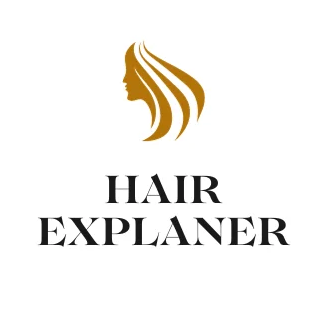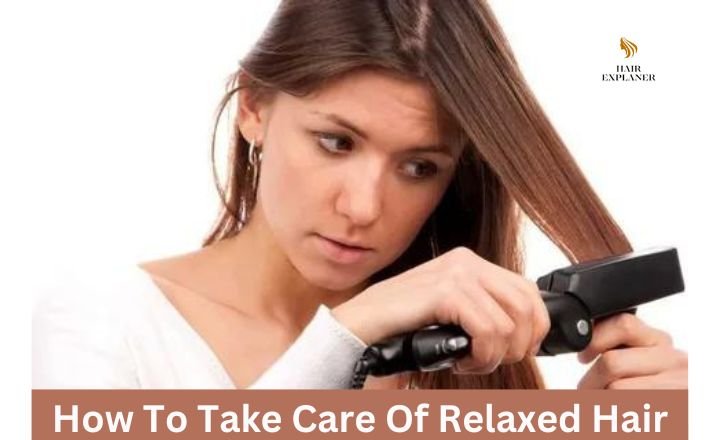Imagine stepping out into the world with hair that feels like silk under your fingertips and looks as strong as a fortress against damage – it’s not just a dream anymore. From essential tips on washing and conditioning to expert advice on styling and protective measures, here in this article, How To Take Care Of Relaxed Hair, we’ve got you covered every step of this journey towards luxurious hair care mastery.
What is relaxed hair?
Relaxed hair refers to chemically treated hair that has been straightened to relax the natural curl pattern, regardless of whether the original texture was wavy, curly, or coily. This process involves using chemical relaxers to break down the protein bonds in the hair, altering its structure permanently.
Unlike natural hair that maintains its curl pattern and requires specific care routines to enhance those curls, relaxed haircare offers a completely different styling versatility for those seeking a sleeker and more manageable look.
What is a relaxer?
Sodium hydroxide, also known as lye relaxer, is the most commonly used type of relaxer due to its effectiveness in straightening tightly coiled hair. It works by breaking down the protein bonds in the hair shaft to create a smoother texture. This type of relaxer can be harsh on the scalp and may cause irritation or damage if not applied properly.
Calcium hydroxide relaxers are known for their gentler formula than sodium hydroxide relaxers. They work by slightly swelling the hair shaft rather than fully breaking down the protein bonds, resulting in less damage and potential for scalp irritation. This makes calcium hydroxide relaxers popular for individuals with more sensitive scalps or finer-textured hair.
Damaged Relaxed Hair
Many struggle with damaged, relaxed hair but hesitate to talk about it. This hair type uses chemical treatments to change its texture, which may seem easy to manage initially. However, without proper care, it can quickly dry, break easily, and grow poorly. Healthy, relaxed hair needs more than just regular touch-ups; it requires moisturizing products and gentle styling techniques to regain health.
Instead of seeing damage as a failure, we can view it as a chance to learn and improve. Deep conditioning treatments, protein masks, and protective hairstyles can help restore the hair’s natural beauty and boost confidence. It’s also important to pay attention to your hair’s needs, especially with changes in weather or seasons, to create the best care routine.
By understanding these needs, we can build resilience in damaged, relaxed hair instead of giving up. It’s about creating a personal healing journey that turns what seems like a loss into a fresh start.
Tips for healthy relaxed hair
There are different ways to have healthy, relaxed hair.

Schedule a Weekly Wash.
Regularly washing your relaxed hair is crucial for maintaining its health and appearance, particularly in the warmer months when external factors like sun exposure, chlorine from pools, and saltwater at the beach can wreak havoc on chemically treated hair.
Cleansing your hair at least once a week helps to remove the buildup of products, sweat, and environmental pollutants that can weigh down your strands and lead to dullness. Frequent washing ensures your scalp stays clean and healthy, promoting optimal hair growth.
To keep your relaxed locks looking their best year-round, consider creating a weekly wash schedule that aligns with your lifestyle and personal preferences. Experiment with different cleansing techniques and products to find what works best for you—whether co-washing with a conditioner between shampoos or incorporating deep conditioning treatments to nourish dry ends.
By making regular washing a priority in your hair care routine, you’ll maintain the integrity of your chemically processed hair and promote overall scalp health for long-term results.
Incorporate deep treatments
Hot oil treatments, for example, can provide much-needed moisture and nourishment to combat dryness and breakage. Deep conditioners are another essential part of a healthy hair care routine, as they help strengthen and repair damaged strands from within.
Hair masks are like a spa day for your tresses, offering intensive hydration and rejuvenation that regular conditioners can’t match. By making time for these treatments in addition to your regular washes, you’re investing in your relaxed hair’s long-term health and vitality.
So next time, don’t forget to schedule some self-care time for your locks with deep treatments that will leave them looking their best.
Use an oil
Relaxers may give your hair a sleek, straight look, but they come with a price – weakened hair shafts. Incorporating oils like coconut can be a game-changer to counteract this damage and maintain the health of your relaxed locks. Coconut oil contains trace amounts of protein, which can help strengthen and nourish the hair from within, providing essential support to prevent breakage and promote growth.
Avoid hot Tools
Reduce the reliance on hot tools for straightening and styling hair. The chemical process breaks down the natural curl pattern and weakens the hair follicles, making them more susceptible to damage from heat styling.
By embracing your relaxed hair texture, you can minimize the daily use of flat irons and blow dryers, ultimately leading to healthier and less damaged strands.
How long does relaxer last?
Regular touch-ups and reapplications of relaxers are essential for maintaining healthy, relaxed hair types. It is recommended to touch up the roots every 6-8 weeks, depending on your hair growth rate.
Neglecting these touch-ups can lead to new hair growth being left untreated, resulting in a noticeable difference in texture between the relaxed and natural sections. This contrast can weaken the hair shaft and cause breakage, making it crucial to stay on top of touch-up appointments to prevent damage.

Can relaxers damage hair?
Relaxers have been demonized as the destroyer of hair health, but having relaxed hair doesn’t automatically equate to having damaged locks. Proper maintenance and care tailored to your specific hair needs.
Using high-quality products, incorporating regular deep conditioning treatments, and avoiding over-processing, you can transform chemically-treated hair into a mane that exudes health and vitality.
Be mindful of your diet
A diet rich in vitamins, minerals, and proteins can do wonders for hair strength and vitality. Incorporating foods like leafy greens, nuts, and fish into your meals can nourish your hair from the inside out.
Staying properly hydrated is crucial for maintaining moisture in your hair strands. Drinking plenty of water daily benefits your health and ensures that your hair remains hydrated and less prone to dryness or breakage.
How To Take Care Of Relaxed Hair And Make It Grow
To care for relaxed hair and promote its growth, it is essential to maintain a consistent routine of deep conditioning treatments. These treatments help nourish the hair strands and prevent damage caused by chemical processing. Incorporating scalp massages into your hair care routine can stimulate blood flow to the scalp, promoting healthier hair growth.
Trimming your ends regularly is crucial for preventing split ends and breakage, which can hinder hair growth. Protective styling, such as braids or buns, can also help protect your hair from environmental elements and reduce manipulation that can lead to damage. High-quality products formulated for relaxed hair types will help keep your strands healthy and moisturized, supporting optimal growth potential.
Conclusion
Taking care of relaxed hair to make it silky and strong requires a consistent moisturizing regimen, conditioning, and protecting it from damage. How To Take Care Of Relaxed Hair? By incorporating deep conditioning treatments, using heat protectants, and avoiding harsh chemicals, you can maintain the health and vibrancy of your relaxed hair. Listen to your hair’s needs and adjust your routine to ensure optimal health.
Patience and consistency are key to achieving and maintaining silky, strong, relaxed hair. By following these tips and committing to a proper hair care routine, you can enjoy beautiful, healthy hair that radiates strength and shine. Take the time to care for your relaxed hair properly.
Frequently Asked Questions
1. What does relaxed hair mean?
Relaxed hair is hair that has been treated with a relaxer or straightening product to make it smoother and straighter. This process changes the curly hair, making it easier to style. Use good techniques and products to keep your hair healthy when relaxing at home or in a salon.
2. How can I make my relaxed hair soft and silky?
Follow a regular hair care routine to keep relaxed hair soft and silky. Use a mild shampoo and conditioner made for relaxed hair. Deep condition once a week to add moisture and improve hair texture. Use a leave-in conditioner or hair oil to keep hair hydrated and smooth.
3. What is the best treatment for relaxed hair?
For healthy, relaxed hair, use gentle shampoo and conditioner made for chemically treated hair. Deep conditioning treatments help restore moisture and strength of relaxed hair.

